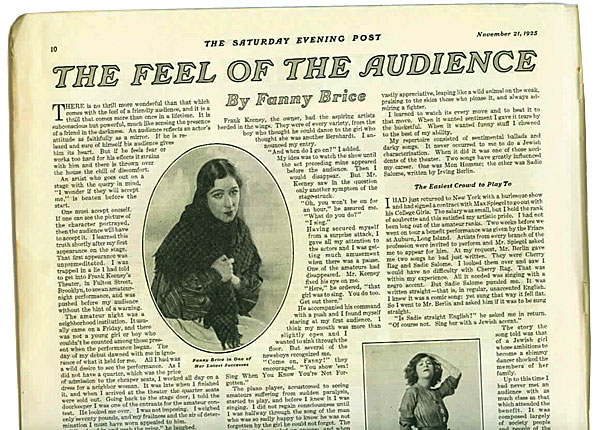
There is no thrill more wonderful than that which comes with the feel of a friendly audience, and it is a thrill that comes more than once in a lifetime. It is subconscious but powerful, much like sensing the presence of a friend in the darkness. An audience reflects an actor's attitude as faithfully as a mirror. If he is relaxed and sure of himself his audience gives him its heart. But if he feels fear or works too hard for his effects it strains with him and there is thrown over the house the chill of discomfort.
An artist who goes out on a stage with the query in mind, "I wonder if they will accept me," is beaten before the start.
One must accept oneself. If one can see the picture of the character portrayed, then the audience will have to accept it. I learned this truth shortly after my first appearance on the stage. That first appearance was unpremeditated. I was trapped in a lie I had told to get into Frank Keeney's Theater, in Fulton Street, Brooklyn, to see an amateur- night performance, and was pushed before my audience without the hint of a warning.
The amateur night was a neighborhood institution. It usually came on a Friday, and there was not a young girl or boy who couldn't be counted among those pres-ent when the performance began. The day of my debut dawned with me in ignorance of what it held for me. All I had was a wild desire to see the performance. As I did not have a quarter, which was the price of admission to the cheaper seats, I worked all day on a dress for a neighbor woman. It was late when I finished it, and when I arrived at the theater the quarter seats were sold out. Going back to the stage door, I told the doorkeeper I was one of the entrants for the amateur con-test. He looked me over. I was not imposing. I weighed only seventy pounds, and my frailness and the air of determination I must have worn appealed to him.
"Go ahead in and grab the prize," he laughed.
Frank Keeney, the owner, had the aspiring artists herded in the wings. They were of every variety, from the boy who thought he could dance to the girl who thought she was another Bernhardt. I announced my entry.
"And when do I go on?" I added.
My idea was to watch the show until the act preceding mine appeared before the audience. Then I would disappear. But Mr. Keeney saw in the question only another symptom of the stage-struck.
"Oh, you won't be on for an hour," he assured me. "What do you do?"
"I sing."
Having secured myself from a surprise attack, I gave all my attention to the actors and I was getting much amusement - when there was a pause. ~ One of the amateurs had disappeared. Mr. Keeney ~ fixed his eye on me. "Here," he ordered, "that - girl was to sing. You do too. Get out there."
He accompanied his command with a push and I found myself staring at my first audience. I think my mouth was more than slightly open and I wanted to sink through the floor. But several of the newsboys recognized me. "Come on, Fanny!" they encouraged. "You show them!"
Sing when you know you're not forgotten
The piano player, accustomed to seeing amateurs suffering from sudden paralysis, started to play, and before I knew it I was singing. I did not regain consciousness until I was halfway through the song of the man who was so sadly happy to know he was not forgotten by the girl he could not forget. The audience demanded an encore; and when Mr. Keeney had convinced me of this by pushing me forth again, I sang Cheer Up, Mary. The rules of an amateur night are simple. The performers go through their acts-if lucky-and when all are finished they parade across the stage. The one who gets the most applause wins the prize. I won it that night, mostly through the strength of the lungs of my supporters. It was a five-dollar gold piece and I don't think I waited to say "Thank you." I streaked home and burst in on my mother.
A professional amateur
"MAMMA," I yelled, "look what I got! Five dollars, just for singing two songs at Keeney's. I'm going to be an actress."